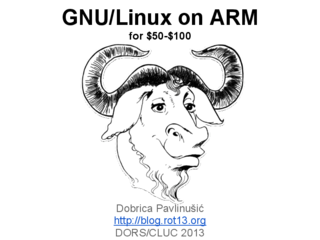 Last week we had another annual conference about Free Software and Open Source DORS/CLUC 2013. For a last year, I was playing with various hardware, so this year, I was part of Internet of things panel (talking about ARM based machines), and I had lecture about GNU/Linux on ARM devices for $50-$100.
Last week we had another annual conference about Free Software and Open Source DORS/CLUC 2013. For a last year, I was playing with various hardware, so this year, I was part of Internet of things panel (talking about ARM based machines), and I had lecture about GNU/Linux on ARM devices for $50-$100.
I also submitted hardware workshop for program which got accepted, so I quickly realized that I'm really no hardware expert and that I could use some help to make interesting workshop. Fortunately I have a few good friends who know more about hardware that I ever will, so I summoned Lovro and Dalibor to help me cover hardware and antenna design. Few weeks ago I was at NSND Belgrade 2013 where I had good fortune to meet Filip who is working for Dangerous Prototypes. I couldn't really believe my good luck since I wanted to talk about Bus Pirate a great multi-purpose tool which got me into hardware in the first place. So, in the end, I had three very skillful people to back me up in this workshop which was hopefully useful and interesting to people attending it. For future reference, I will include a few links below about topics we convered:
- Filip started with Bus Pirate including it's supported protocols I2C, SPI, 1-wire, UART, JTAG (and others) and example of using it to communicate with I2C EEPROM
- Dalibor make great presentation about antenna design, including practical examples for ADS-B and 443.92 antenna (simple one from coax cable and one with RF filter for PiHAT) while I tried to explain why RTL-SDR DVB-T sticks made it possible to listen to various your IMS sensors using rtl_443.
- Next, Filip again took stage to speak about Open Hardware and possibilities to manufacture and sell such devices based on expirience of Dangerous Prototypes cooperation with Seeed Studio.
- In last part of our workshop we played with blinkm, took questions and discussed other Dangerous Prototypes projects which we had with us which included USB Infrared Toy, Bus Blaster and Open Bench Logic Sniffer but we also talked and showed Arduino and Mojo FPGA board which we had us also to ZPUino which is interesting combination of Papilio FPGA and Arduino IDE. Lovro did a nice overview of FPGAs and how are they different from software programming.